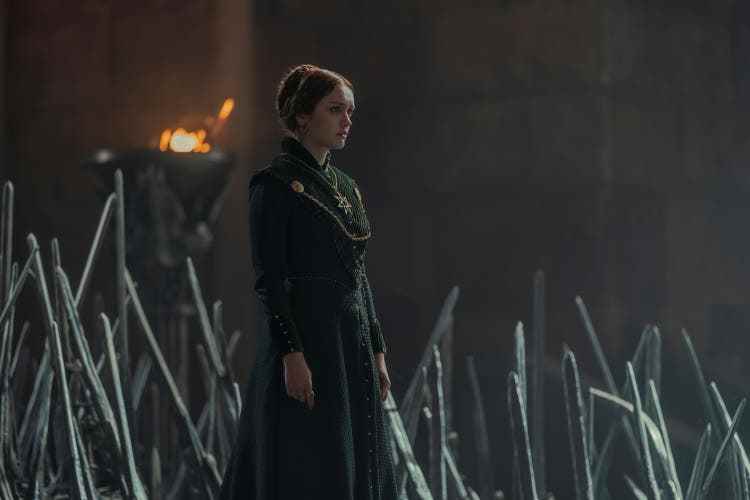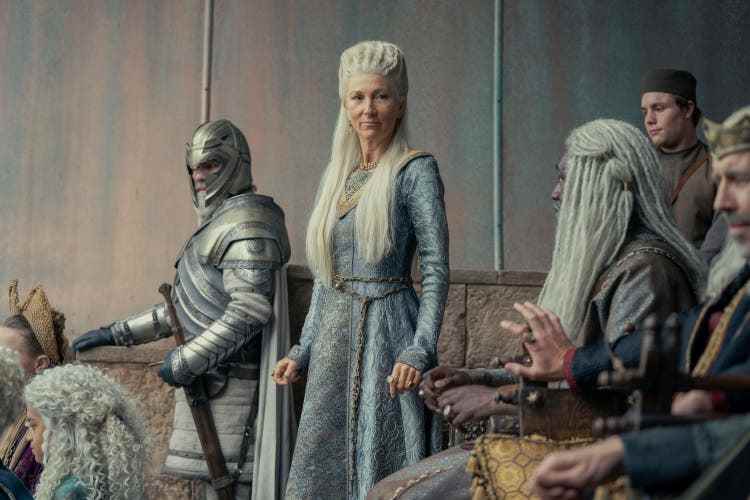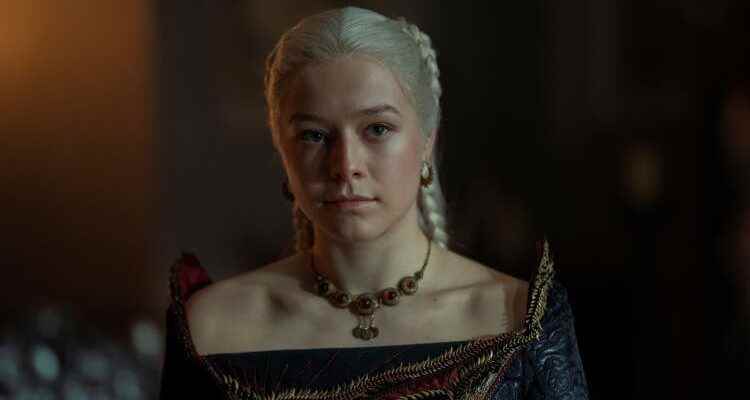HBO’s new prestige project has emancipated itself from “Game of Thrones” episode by episode. Three strong protagonists position themselves in the outlook for a second season.
To die for: Emma D’Arcy in the role of Rhaenyra Targaryen.
Comparisons are always thankless. Will the new come close to the old, but please be sure to surprise with creativity? Will it be able to put everything in a new light without outshining or even compromising the tried and tested?
It is probably no exaggeration to say that no series was launched with such expectations on the part of the audience as “House of the Dragon” (“HotD”) two months ago. The creators didn’t even try to compete with the most merciless character murder, the man-made madness, the loudest shock moments that made “Game of Thrones” (“GoT”) great. In the prequel about the Targaryens’ succession dispute, there is just as much “GoT” in it as necessary to attract fans of the original, and as little as possible so that the series also works for newcomers.
Some things appear in a new light
The chatter at the Targaryen court may initially seem a bit harmless compared to the deadly intrigues that blossom among the Lannisters later in «GoT» in King’s Landing. The manorial maneuvers may seem more like activism than politics. And if characters that tower far above the ensemble, such as Cersei or Tyrion Lannister or Arya Stark, are largely dispensed with, then the comparison here is superfluous.
Because the restrained, calm narrative threads soon come together to form a cleverly laid out, carefully thought-out plot that is less excited than realistically colored. People are sometimes better, sometimes malicious, driven by a thirst for power and jealousy, vulnerable or badly damaged – yes, they are often more normal, more human. All of this makes the new series, which is about two centuries before “GoT”, appear surprisingly modern.

Once Rhaenyra’s best friend, now her greatest rival: Alicent Hightower (Olivia Cooke).
Royal Chamber Play
There was a time in the Targaryen lineage when they did not want to take on the gods. “HotD” tells how the self-destructive insanity could come about in the family. It comes full circle here in a fascinating way when, under all these signs that the prequel tells, the follow-up story to “Game of Thrones” opens up again from a new perspective.
The new work, the launch of which temporarily paralyzed the HBO Max servers, could not be given a greater compliment: “House of the Dragon” may feel a bit like a copy in the first few episodes, but then it develops into an independent series , which, more chamber play than spectacle, does not harm the great original, but adds a new perspective to the whole.
The central phrase in the Targaryen family comes from Rhaenyra Targaryen (Emma D’Arcy) when she admonishes her son towards the end of season one: “We don’t choose our fate, it chooses us.” Armed with this awareness, it is the women in «HotD» who take their destiny into their own hands, appear increasingly self-determined and assume the central strategic roles. On the other hand, the men try to enforce their will, sometimes violently, sometimes blackmailed, and remain in their pattern like Daemon, who, thanks to Matt Smith’s diabolical acting, already shows the self-destructive, megalomaniac Targaryen gene very well.
The women are the power strategists: Rhaenys (Eve Best), who was inferior to the younger cousin Viserys (Paddy Considine) in the succession to the throne (“The Queen that never was”); Viserys’ daughter Rhaenyra (Milly Alcock, later Emma D’Arcy), who also passes the line of succession, definitely making her the great rival of her father’s second wife, Alicent Hohenturm (Emily Carey, Olivia Cooke).

“The Queen That Never Was”: Eve Best as Rhaenys Targaryen.
The agony of childbirth
When Rhaenyra (Emma d’Arcy plays this to your knees) learns of the death of her father and a surreptitiously installed heir to the throne, the possibility of a coup d’état looms. It’s interesting to hear how the women decide. Especially since in our day the question of how rebellions start suddenly feels less abstract again. Is the throne worth burning down all of Westeros with the help of the dragons? “HotD” expands the view of women in a pleasant way – away from the image fixed in “GoT” between hysterical lust for power, privileged daughters and the victimhood of whores.
A lot is born in this first season. Archaic and difficult to bear birth scenes run through the first season as metaphors of human existence like a trail of red blood. “The childbed is our battlefield,” Rhaenyra’s mother says to her daughter at the beginning. This draws a link to the butcher-like miscarriage of Rhaenyra in the finale, which is painful to watch after she found out about the death of her father and the outrageous enthronement of one of her half-brothers. The conflict is set, the antipodes of state power and great personal pain are named – a promising starting point for the sequel.
What is missing from this first season, however, is the black humor that made difficult things easy in “Game of Thrones” thanks to characters like Tyrion, Arya or Jamie Lannister’s companion Bronn. There is still room for improvement for the planned second season (probably broadcast in 2024).
